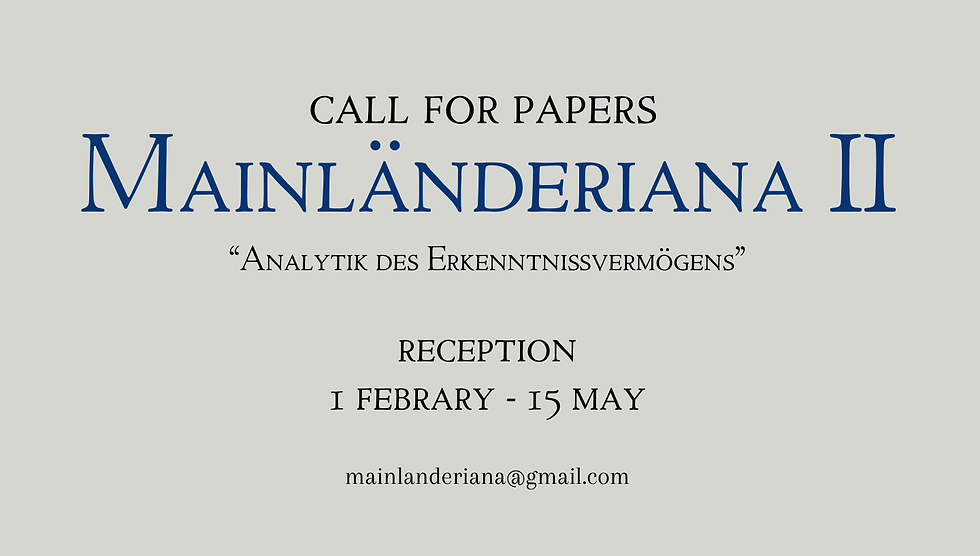CALL FOR PAPERS FOR THE THIRD ISSUE -PESSIMISM AND THE NATIONAL QUESTION
- cuadernosdepesimis
- Jun 21, 2023
- 4 min read

CALL FOR PAPERS FOR THE THIRD ISSUE -
PESSIMISM AND THE NATIONAL QUESTION
SCHOPENHAUER AND POLITICS: ATTEMPTS AT IDEOLOGICAL MANIPULATION
In the history of contemporary philosophy, Arthur Schopenhauer distinguished himself as a metaphysical philosopher and, equally, as the founder of the ethics of compassion. From this is coherently derived a principle of universal solidarity capable of extending to every being susceptible to suffering. Even the thought of the author of The World as Will and Representation was subjected to attempts at politicization, decontextualization and, also, reduction in a nationalist key. Although it is true that the great Frankfurt philosopher always shunned the political arena and disliked all forms of nationalism - in particular German nationalism - some representatives of the Schopenhauer-Schule tried to give a national twist to his thought. They were influenced by the character of the century itself and, moreover, by the desire for a unitary constitution of the German people into a great Germanic nation.
On the other hand, Schopenhauer’s position on Judaism was more complex. According to the master of pessimism, this religious confession had the grievance of having introduced optimism into primitive Christianity. However, for Schopenhauer it is an eminently philosophical question related to metaphysics and certainly not to racial discrimination. This allows us to understand - but certainly does not justify – Schopenhauer’s invective against the Jewish religion. That it is a case of philosophical prejudice against the Jewish religion and not against the Jews as a people is attested to by the fact that, in the whole of Schopenhauer’s very large corpus, he did not use the term “race” in relation to the Jews. Moreover, there is no Juden-Frage in Schopenhauer’s Werke. Finally, it is known that Schopenhauer had among his closest disciples some thinkers of Jewish origin. Among them, the arch-evangelist Julius Frauenstädt who was his confidant and the first editor of the Schopenhauerian Werke. Wilhelm Gwinner was his biographer and executor, as well as Carl Georg Bähr, whom Schopenhauer considered one of his most acute evangelists. In addition, among his disciples was the well-remembered David Asher, who repeatedly tried to demonstrate the convergence between the Jewish religion and Schopenhauerian ethics.
In contrast, the philosophical stance of some Schopenhauer-Schüler is tinged with nationalistic overtones. In the cases of Eduard von Hartmann and Philipp Mainländer, both are influenced by forms of National Socialism and nationalistic temptations derived, respectively, from Hegel and Fichte. However, they remain interpretations that openly distance themselves from the thought of the Frankfurt philosopher and clash strongly with the Schopenhauerian ethics of compassion.
When Paul Deussen founded the Schopenhauer-Gesellschaft in 1911, this great scholar of religions was concerned to protect Schopenhauer’s work from any temptation of ideological or partisan manipulation. According to Deussen, the newly founded society should strive “not for a one-sided propaganda” but “to seek, in an exchange of thoughts, an agreement on the problems that Schopenhauer’s doctrine poses in good measure to the spirit of thinking people.” Therefore, Deussen significantly appeals to “spiritual freedom with respect to all traditions which Schopenhauer’s genius spread in ever widening circles in our homeland and beyond.” Thus, the Schopenhauer-Gesellschaft was founded under the banner of freedom, cultural cosmopolitanism and universal compassion. It is no coincidence that among its members are listed great pacifist intellectuals such as the Nobel Prize for Literature Romain Rolland, philosophers of the stature of Hans Vaihinger, Piero Martinetti, Martin Buber, Max Horkheimer and Norberto Bobbio. Also, writers such as Theodor Lessing, Stefan Zweig and Italo Svevo. Let us not forget that, in addition, Schopenhauer’s pen inspired universal geniuses such as Machado de Assis, Thomas Mann and Jorge Luis Borges.
However, on the basis of Schopenhauer’s invectives and immediately after Deussen’s death in 1920, the first overt attempt was made to instrumentalize Schopenhauer by an ultranationalist and anti-Semitic faction, led by Maria Groener and Jo Weber. The affair ended with the expulsion of Groener and her few allies from the International Society founded by Deussen and the creation of the self-styled Neue Deutsche Schopenhauer-Gesellschaft, which, in the end, did not last long and did not make any scientific contribution to the study of Schopenhauer’s thought. However, the establishment of the NDSG was not the first attempt at ideological manipulation of Schopenhauer’s philosophy from which the Schopenhauer-Gesellschaft had to defend itself, among many difficulties, during the years of the Nazi dictatorship. Let us think, for example, of the Nazi interpretation of Schopenhauer by Alfred Rosenberg. We should also note the nationalist reading of Richard Wagner, from which Friedrich Nietzsche kept his distance. The author of Thus Spoke Zarathustra will suffer, in turn, an even more significant attempt to Nazify his thought. We must consider that Wagner’s interpretation will have a large following, not only in Germany, during the two world wars.
Finally, it should be remembered that, despite the Nazification of German institutions and culture under the so-called “Third Reich”, the Schopenhauer-Gesellschaft will be the only German cultural institution that will never adopt the “Aryan paragraph”. The ethics of compassion will always be an obstacle to any nationalistic and racial manipulation of Schopenhauer’s thought.
With the above remarks in mind, the present call aims to:
- deepen the relationship between pessimism and nationalism in the history of contemporary thought;
- investigate the relationship between pessimism and nationalism in the fortunes of Schopenhauer’s thought;
- investigate the figures and events related to the attempted ideological manipulation of Schopenhauer’s philosophy;
- to analyze the relationship between Schopenhauer’s critique of optimism and the critique of Jewish religion; and
- to compare the cosmopolitan tendency of Schopenhauerian thought with its nationalistic misrepresentation
Fabio Ciracì






Comments